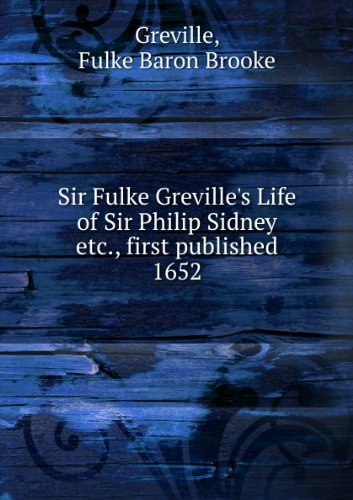Background
Fulke Greville was born on October 3, 1554, at Beauchamp Court, near Alcester, Warwickshire, to Sir Fulke Greville and Anne Neville.



(This book, "Sir Fulke Greville's Life of Sir Philip Sidne...)
This book, "Sir Fulke Greville's Life of Sir Philip Sidney etc., first published 1652. 2", by Greville, Fulke Baron Brooke, is a replication of a book originally published before 1907. It has been restored by human beings, page by page, so that you may enjoy it in a form as close to the original as possible. This book was created using print-on-demand technology. Thank you for supporting classic literature.
http://www.amazon.com/gp/product/B003DUN6BY/?tag=2022091-20
Fulke Greville was born on October 3, 1554, at Beauchamp Court, near Alcester, Warwickshire, to Sir Fulke Greville and Anne Neville.
He was educated at Shrewsbury School. Then he studied at Cambridge.
He was appointed chancellor of the exchequer in 1614, and created first Baron Brooke in 1621.
Greville was an informed observer of international affairs and wished to see a Protestant League in Europe; but his efforts to forward it were thwarted by royal authority, with the result that he developed a cynical attitude toward politics which is mirrored in his Senecan closet dramas, Mustapha and Alaham, published in 1609 and 1633, but probably written before 1600.
In his youth he composed Caelica, 109 short poems on love, philosophy, and religion, some modeled on sonnets in Sidney's Astrophel and Stella. He also wrote philosophical poems, Humane Learning, Fame and Honour, Warres, Monarchy, and Religion, published posthumously in 1633 and 1670, and A Life of Sir Philip Sidney, 1652. A bachelor and a constant courtier of the ladies, he desired to be remembered as "Servant to Queen Elizabeth, Councellor to King James, and Frend to Sir Philip Sydney. "
His poetry has an intellectual character and a reflective quality peculiarly his own.
(This book, "Sir Fulke Greville's Life of Sir Philip Sidne...)
He was a mean and miserly man, but he had a fine philosophical intelligence.
Lord Brooke left no natural heirs.
